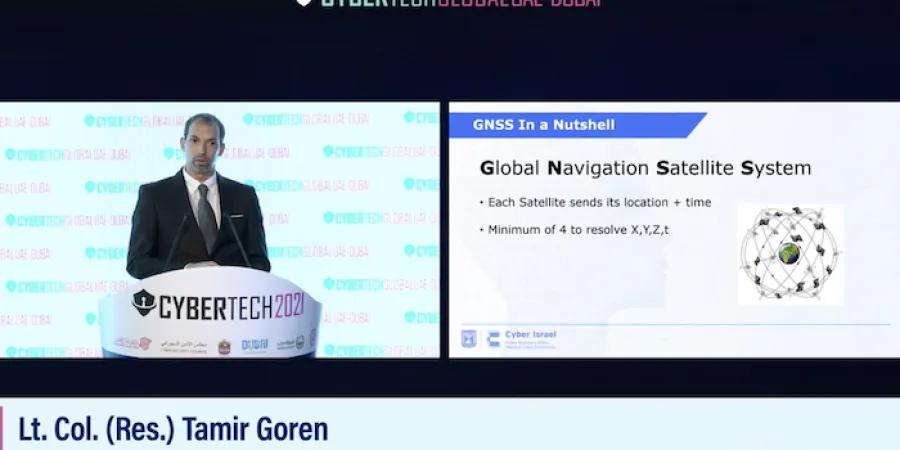Israel’s Cyber Directorate calls for international cooperation on GNSS spoofing
At the Cybertech Global conference in Dubai. Director of Special Technologies at the Cyber Directorate, Tamir Goren, discussed the ease at which a plane can be downed or a ship can be steered off course. “Don’t always assume you have the correct signal”, he says.
Mandi Kogosowski
| 06/04/2021
A US drone downed by Iran in 2011, a multi-million yacht steered off course in 2013, a major attack in the Black Sea in 2016, interference in the Mediterranean in 2019—these are just a few examples of the dangers that lie in Global Navigation Satellite Systems (GNSS) spoofing.
“GNSSs are used everywhere these days: in our smartphones and smart watches, on ships, planes, cars, electric grids, communications systems—all of those rely on GNSSs to operate, but interfering with the GNSS is very easy,” says Tamir Goren, Director of Special Technologies at the Israel National Cyber Directorate. Goren (who also provided the abovementioned examples) spoke earlier today (Tuesday) at the Cybertech Global conference in Dubai.
“The satellites are high in space so the signal arriving is weak, and easy to overcome. Also, it’s not encrypted and not authenticated,” explains Goren, and goes on to describe the two main types of interference: jamming, and spoofing.
“Jamming is easy to identify, the system just gets stuck. Spoofing is much more sophisticated, it involves creating a signal that is received as authentic,” says Goren. “Jammers and spoofers come in all shapes and sizes, from very simple devices to very advanced software.”
Goren offers a few ways to tackle the problem, the first on the list being awareness. “Simple, don’t always assume you have the correct signal,” he says. In addition, one needs the proper technology for detection and monitoring potential spoofing attempts, as well as various forms of backup, such as atomic clocks, local transmitters, LEO satellites that have a more resilient signal, and inertial navigation systems (INS).
“We see this as a global effort”, concluded Goren, “and we call on any nation that would like to look into a joint solution to come and speak with us.”
At the Cybertech Global conference in Dubai. Director of Special Technologies at the Cyber Directorate, Tamir Goren, discussed the ease at which a plane can be downed or a ship can be steered off course. “Don’t always assume you have the correct signal”, he says.
A US drone downed by Iran in 2011, a multi-million yacht steered off course in 2013, a major attack in the Black Sea in 2016, interference in the Mediterranean in 2019—these are just a few examples of the dangers that lie in Global Navigation Satellite Systems (GNSS) spoofing.
“GNSSs are used everywhere these days: in our smartphones and smart watches, on ships, planes, cars, electric grids, communications systems—all of those rely on GNSSs to operate, but interfering with the GNSS is very easy,” says Tamir Goren, Director of Special Technologies at the Israel National Cyber Directorate. Goren (who also provided the abovementioned examples) spoke earlier today (Tuesday) at the Cybertech Global conference in Dubai.
“The satellites are high in space so the signal arriving is weak, and easy to overcome. Also, it’s not encrypted and not authenticated,” explains Goren, and goes on to describe the two main types of interference: jamming, and spoofing.
“Jamming is easy to identify, the system just gets stuck. Spoofing is much more sophisticated, it involves creating a signal that is received as authentic,” says Goren. “Jammers and spoofers come in all shapes and sizes, from very simple devices to very advanced software.”
Goren offers a few ways to tackle the problem, the first on the list being awareness. “Simple, don’t always assume you have the correct signal,” he says. In addition, one needs the proper technology for detection and monitoring potential spoofing attempts, as well as various forms of backup, such as atomic clocks, local transmitters, LEO satellites that have a more resilient signal, and inertial navigation systems (INS).
“We see this as a global effort”, concluded Goren, “and we call on any nation that would like to look into a joint solution to come and speak with us.”



